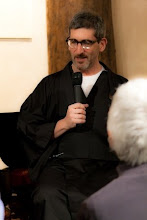The Buddha cautioned against taking any teaching on faith, encouraging his students to test and verify all teachings against their own experience. Likewise, “modern scientific method” dictates that the world be explored through a repetitive cycle of testing of hypotheses through experimentation, data collection, analysis, and hypothesis revision. If experiments can’t consistently be reproduced, then the data is not believed and the hypothesis revised. Nothing on faith.
These approaches have each produced extensive descriptions of the nature and structure of existence through use of the mind. Contemplative practice does so by turning the mind inward, scientific method largely by exploring outward.
It has been my experience that these approaches are not only complementary, but in fact lead to the same descriptions of reality. Whether we discuss Buddhist metaphysics or Hindu or Jewish mysticisms (the systems of metaphysical thought with which I’m to some extent familiar), the science arrives at the same insights as contemplative practice.
For Buddhism, these insights include the interrelated truths of impermanence, interdependence, emptiness of inherent existence and karmic law (i.e. that all effects arise from prior causes and these effects then become the causes for future effects).
For me, the powerful aspect of my experience has been that the conceptual insights of contemporary science have literally become koans, thereby leading me increasingly to experience the concepts rather than simply know them.
It is this shift from knowledge to experience that I hope to share with you over the course of Winter Ango 2010, culminating in visits to the Museum of Natural History during Urban Sesshin, in March.
While advance preparation for Urban Sesshin is certainly not necessary, I wanted to offer readings, viewings and exercises for those who wish to begin working now. These recommendations represent opportunities that I’ve stumbled upon for painlessly learning what contemporary science says about the nature of reality – how it is organized and how it functions – so that we can hold those facts within our Practice Minds and, hopefully, broaden our experience of the world and our understanding of the nature of the Self.
If any of you have further suggestions from your own experiences, by all means please recommend them as comments to these blog entries below and I’ll add them to the entries themselves.
And if you have interesting questions or insights from swimming in this knowledge by all means add your comments and perhaps a community-wide conversation will emerge, too!
Tuesday, January 26, 2010
Subscribe to:
Post Comments (Atom)

Oh, my. Here i am in NYC, away from and missing my newish Zen group in Santa Fe NM (Awakenedlife.org), a board member, on the 'leadership council', like an ant trying to figure out where my colony can use me in this NY part of the colony, and how as an ant i might contribute to the Village Zendo without sticking onto many opinions about all of this. Best is your Tricycle idea of no backward no forward...add no East Coast and No West Coast.
ReplyDeleteWelcome to New York and to VZ Mary Jane! And, yes, no backward/forward, no East/West. As in The Identity of Relative and Absolute Sutra: "...in the Way there is no Northern or Southern Ancestor" after all ;-)
ReplyDeleteHi Soten,
ReplyDeleteI read your article "From the Bottom Up" with fascination. I think I now do have a better understanding of "emptiness", a Buddhist concept that has always frustrated me. I confess though, that I am having a hard time seeing Complexity Theory as applied to living organisms in relation to Natural Selection Theory. Maybe you could do a piece discussing this or direct me to some resource(s)? Thanks for the wonderful work. - Mark Eko Morris
Hey Mark!
ReplyDeleteWhy do you think it might not apply to Natural Selection? Tell me your thoughts.
But, meanwhile, I would recommend actually reading one of the complexity books listed above to first get a fuller idea of the principles - what i present in the Tricycle piece is quite barebones. I think Lewin's book might actually discuss evolution if i recall...
After you read a bit more, see how far you can work that question out for yourself - playing with the ideas is part of the fun of it AND Complexity is surprisingly simple stuff, in fact!
At the same time,I have written a piece (unpublished) on how a complexity viewpoint of evolution is a good (actually, i think best) answer to the Creationist perspective. They say: it appears designed, so it must be. Complexity theory gives us the way to explain that appearance, but as a bottom up phenomenon. I can email that editorial to you if you want, just send me your address.
It is one of the commonest of mistakes to consider that the limit of our power of perception is also the limit of all there is to percive.
ReplyDeleteLefty Genkyo
Hi Soten,
ReplyDeleteMy question might be more clearly stated as "Could you please describe the relationship between evolved, genetically driven behaviors (in ants for example) and the emergent, self organizing behaviors of living creatures in groups? But I will take your advice and do some more reading first. I would be interested in the editorial that you mentioned in your reply. Please send to markfmorris@gmail.com. Thank you for taking the time to reply.